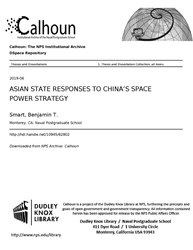File:ASIAN STATE RESPONSES TO CHINA’S SPACE POWER STRATEGY (IA asianstaterespon1094562802).pdf

Original file (1,275 × 1,650 pixels, file size: 1.18 MB, MIME type: application/pdf, 126 pages)
Captions
Captions
Summary[edit]
| ASIAN STATE RESPONSES TO CHINA’S SPACE POWER STRATEGY
( |
||
|---|---|---|
| Author |
Smart, Benjamin T. |
|
| Title |
ASIAN STATE RESPONSES TO CHINA’S SPACE POWER STRATEGY |
|
| Publisher |
Monterey, CA; Naval Postgraduate School |
|
| Description |
China’s rise as a space power has coincided with its quest for hegemony in the Indo-Pacific. Advances in China’s space capabilities constitute a threat to regional states’ national security, economic competitiveness, and national prestige. Accordingly, regional space powers have revised their strategies to better compete with China. This thesis examines Japan’s, India’s, and Vietnam’s renewed approaches to space power and space security amidst China’s rise. Shifts in military, commercial, and civil space policy are examined among the selected case studies. This thesis finds that Asian states are departing from historical norms by employing militarized space assets to counter the security threat from China. They are also allowing the private sector to play a larger role in their commercial space industry to improve efficiency, innovative capacity, and diplomatic outreach. Bilateral and multilateral cooperation, as well as investments in techno-nationalist space-science projects, also supplement the renewed soft-power response to Chinese space diplomacy. This thesis presents policy prescriptions for the United States to capitalize on the increasing degree of alignment among regional space powers’ strategic interests. Recommendations include enhanced military-to-military relations, relaxation of commercial restrictions, and increased cooperation in civil space to balance against China. Subjects: space; space power; China; Vietnam; India; Japan; civil; commercial; military; diplomacy; soft power; internal balancing; external balancing; balance of power |
|
| Language | English | |
| Publication date | June 2019 | |
| Current location |
IA Collections: navalpostgraduateschoollibrary; fedlink |
|
| Accession number |
asianstaterespon1094562802 |
|
| Source | ||
| Permission (Reusing this file) |
This publication is a work of the U.S. Government as defined in Title 17, United States Code, Section 101. Copyright protection is not available for this work in the United States. | |
Licensing[edit]
| Public domainPublic domainfalsefalse |
This work is in the public domain in the United States because it is a work prepared by an officer or employee of the United States Government as part of that person’s official duties under the terms of Title 17, Chapter 1, Section 105 of the US Code.
Note: This only applies to original works of the Federal Government and not to the work of any individual U.S. state, territory, commonwealth, county, municipality, or any other subdivision. This template also does not apply to postage stamp designs published by the United States Postal Service since 1978. (See § 313.6(C)(1) of Compendium of U.S. Copyright Office Practices). It also does not apply to certain US coins; see The US Mint Terms of Use.
|
 | |
| This file has been identified as being free of known restrictions under copyright law, including all related and neighboring rights. | ||
https://creativecommons.org/publicdomain/mark/1.0/PDMCreative Commons Public Domain Mark 1.0falsefalse
File history
Click on a date/time to view the file as it appeared at that time.
| Date/Time | Thumbnail | Dimensions | User | Comment | |
|---|---|---|---|---|---|
| current | 18:56, 14 July 2020 |  | 1,275 × 1,650, 126 pages (1.18 MB) | Fæ (talk | contribs) | FEDLINK - United States Federal Collection asianstaterespon1094562802 (User talk:Fæ/IA books#Fork8) (batch 1993-2020 #8250) |
You cannot overwrite this file.
File usage on Commons
The following page uses this file:
Metadata
This file contains additional information such as Exif metadata which may have been added by the digital camera, scanner, or software program used to create or digitize it. If the file has been modified from its original state, some details such as the timestamp may not fully reflect those of the original file. The timestamp is only as accurate as the clock in the camera, and it may be completely wrong.
| Author | Aileen B. Houston |
|---|---|
| Short title | ASIAN STATE RESPONSES TO CHINA’S SPACE POWER STRATEGY |
| Image title | |
| File change date and time | 01:22, 20 May 2019 |
| Date and time of digitizing | 01:22, 20 May 2019 |
| Date metadata was last modified | 01:22, 20 May 2019 |
| Software used | Acrobat PDFMaker 17 for Word |
| Conversion program | Adobe PDF Library 15.0 |
| Encrypted | no |
| Page size | 612 x 792 pts (letter) |
| Version of PDF format | 1.4 |

